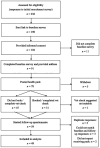Developing and evaluating a health pack to support dog owners to manage the weight of their companion animals
- PMID: 39840344
- PMCID: PMC11746120
- DOI: 10.3389/fvets.2024.1483130
Developing and evaluating a health pack to support dog owners to manage the weight of their companion animals
Abstract
Introduction: Obesity is a serious and prevalent problem in dogs. The causes are multifactorial, but owners play a key role and so this paper reports the development and evaluation of a health pack designed to help owners to manage the weight of their dogs.
Method: The pack was informed by previous research, behavior change theory (i.e., the COM-B model), and interviews with 12 veterinary professionals to identify challenges and potential solutions. Six workshops with a total of 28 dog owners provided feedback on the initial ideas. The pack included information on the importance of weight management, how to weigh and assess body condition score (BCS), a journal to track progress, an infographic illustrating the calorific value of treats, cards to help owners manage difficult situations, and a collar tag for the dog. The acceptability of the materials and potential outcomes were evaluated in a pre-registered pilot trial with a sample of 78 dog owners who were posted a health pack, 49 of whom completed a follow-up questionnaire.
Results: The findings suggested that owners were willing to weigh their dog, found the pack acceptable, and there was preliminary evidence that the weight and BCS of dogs was lower at follow-up than at baseline.
Discussion: The findings illustrate the potential of a health pack for supporting dog owners and provide the basis for a larger RCT to formally evaluate effectiveness.
Keywords: COM-B model; behavioral science; dog; obesity; overweight; owner; weight management.
Copyright © 2025 Webb, Molina, Sheridan, du Plessis, Brown, Abraham, Morton and McKay.
Conflict of interest statement
Thomas L. Webb reports a relationship with Nestle Purina Petcare that includes consulting, funding, and speaking and lecture fees. The remaining authors declare that the research was conducted in the absence of any commercial or financial relationships that could be construed as a potential conflict of interest.
Figures
References
-
- Association for Pet Obesity Prevention (APOP) . Pet obesity prevalence survey and pet owner: weight management, nutrition, and pet food survey. (2018). Available at: https://www.petobesityprevention.org/2018 (Accessed December 3, 2024).
-
- World Health Organization . Obesity and overweight. (2024). Available at: https://www.who.int/news-room/fact-sheets/detail/obesity-and-overweight (Accessed December 3, 2024).
-
- Liu DJX, Stock E, Broeckx BJG, Daminet S, Meyer E, Delanghe JR, et al. Weight-gain induced changes in renal perfusion assessed by contrast-enhanced ultrasound precede increases in urinary protein excretion suggestive of glomerular and tubular injury and normalize after weight-loss in dogs. PLoS One. (2020) 15:e0231662. doi: 10.1371/journal.pone.0231662, PMID: - DOI - PMC - PubMed
LinkOut - more resources
Full Text Sources



